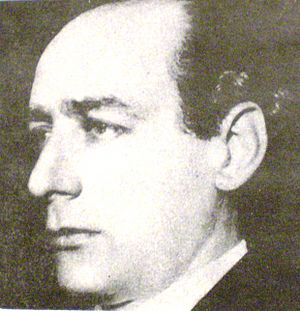Armando Discépolo facts for kids
Quick facts for kids
Armando Discépolo
|
|
|---|---|
 |
|
| Born | 18 September 1887 |
| Died | 8 January 1971 (aged 83) |
| Nationality | Argentine |
| Occupation | playwright, theater producer |
| Years active | 1910–1934 |
| Known for | creating Argentine Criollo Grotesque |
Armando Discépolo (1887–1971) was an important Argentine playwright. He wrote many plays between 1910 and 1934. After that, he focused on producing plays for the theater. He is famous for creating a special type of Argentine play called Criollo Grotesque. This style mixes sad and funny parts, often showing family problems and a bit of dark humor.
Contents
Biography
Armando Discépolo was born on September 18, 1887, in Buenos Aires, Argentina. His family had Italian roots. His mother, Luisa Delucchi, was Argentine but her family came from Genoa. His father, Santo Discépolo, was a musician from Naples.
Armando was the oldest of five children. All of them became artists. He and his younger brother, Enrique Santos Discépolo, who wrote tango songs, were the most well-known. Armando left school after the sixth grade. He first dreamed of becoming an actor.
After his father passed away in 1906, Armando acted in a play. But he soon found acting boring because it was so repetitive. His mother found a notebook full of his writings. She suggested he try writing his own plays. He started writing around 1909.
His first play was called Entre el hierro. He offered it to his friend, Pablo Podestá, who agreed to put it on stage. The play was a big success! After that, Armando wrote about two plays every year until 1934.
Developing Criollo Grotesque
In 1911, he released La torcaz and El rincón de los besos. In 1912, he worked with Rafael José de Rosa on La espuma de mar. His play La fragua from the same year was very popular early on.
With the play Mustafá, written with Rafael José de Rosa, the style known as Criollo Grotesque began to appear. This style was not based on Spanish plays. Instead, it was inspired by Italian theater. It used strong feelings like passion and jealousy. It also showed family conflicts and comic irony. This created a sad and funny mix, almost like a melodrama.
A key part of Criollo Grotesque is that the outside world often doesn't match the characters' inner feelings. For example, a funny setting might hide very sad emotions. Mustafá first played in 1921. Armando kept making this style better with each new play.
His best plays from this later period include Mateo (1923), Stéfano (1928), Cremona (1932), and Relojero (1934). Relojero was his last play that he wrote. However, he did write two movie scripts and one story for a film in the late 1930s and early 1940s. These were Mateo (1937), Giácomo (1939), and En la luz de una estrella (1941).
For the rest of his career, Armando Discépolo produced plays. Many were his own works. But he also produced plays by famous writers like Anton Chekhov, Somerset Maugham, William Shakespeare, George Bernard Shaw, and Leo Tolstoy.
Armando Discépolo passed away on January 8, 1971, in Buenos Aires, Argentina.
Selected works
Here are some of the plays and films Armando Discépolo worked on:
Solo theatrical productions
- Entre el hierro (1910)
- La torcaz (1911)
- La fragua (1912)
- El reverso (1916)
- El vértigo (1919)
- Mateo (1923)
- Hombres de honor (1923)
- Giacomo (1924)
- Muñeca (1924)
- Babilonia (1925)
- Patria nueva (1926)
- Stéfano (1928)
- Levántate y anda (1929)
- Amanda y Eduardo (1931)
- Cremona (1932)
- Relojero (1934)
Collaborative theatrical works
- Espuma de mar (1912) with Rafael José de Rosa
- Mi mujer se aburre (1914) with Rafael José de Rosa
- El novio de mamá (1914) with Rafael de Rosa and Mario Folco
- El patio de la flores (1915) with Federico Mertens
- El guarda 323 (1915) with Rafael José de Rosa
- El movimiento continuo (1916) with Rafael de Rosa and Mario Folco
- Conservatorio La Armonia (1917) with Rafael de Rosa and Mario Folco
- El clavo de oro (1920) with Rafael de Rosa and Mario Folco
- Mustafá (1921) with Rafael José de Rosa
- L´ Italia unita (1922) with Rafael José de Rosa
- Giacomo (1924) with Rafael José de Rosa
- El organito (1925) with Enrique Santos Discépolo
Filmography
- El movimiento continuo (1916) screenwriter
- Mateo (1937) author
- Giácomo (1939) screenwriter
- En la luz de una estrella (1941) screenwriter
- Babilonia (1987) author
See also
 In Spanish: Armando Discépolo para niños
In Spanish: Armando Discépolo para niños
 | Lonnie Johnson |
 | Granville Woods |
 | Lewis Howard Latimer |
 | James West |

